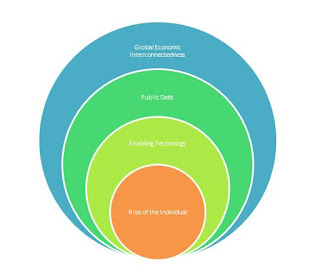APC 3. Global Context
My life has moved across the globe in the last two months
from time in Beijing and walking on the Great Wall of China, Hong Kong and
Macau to sending my heart across the world to Kuwait where a friend’s husband
dies and she begins the arduous task of bringing him home to lie in Te Pakira
Marae here in Rotorua. In my mind, I have been filtering my experiences of
living in Brunei for eight years and the relationships I have formed with
people of different cultures and religions across the world. It seems that the
instantaneous knowing of events across the world such as knowing about the
floods in my niece’s home town in New York state and that her boys are home
from school on the same day that it is happening changes the narratives of our lives. The instantaneous
knowledge of world events in our homes via television and social networks makes
the reality of the global village part of our daily lives. The common trends
that touch us all across the world are broad and generalised and yet they touch
our lives in the micro and macro levels.
In the Future state
2030: the global megatrends shaping governments (2014) there are ten fundamental trends
identified across three domains, individual, physical environment and global
economy.
 |
Fig 1.From Future State 2030: the global megatrends shaping governments 2014.
Some of these megatrends intersected with the themes of a
documentary programme I watched on the
25th May called World Class ?
Inside NZ Education. The programme was hosted by Bryan Bruce who analysed
and compared out education systems with other countries and asked questions about what kind of systems did we
need to have in order to have citizens able to participate and serve the
country in the 21st century.
The four megatrends below are ones that seem to be
particularly significant in our current educational landscape.
1.
Global Economic Interconnectedness
2.
Public Debt
3.
Enabling Technologies
4.
Rise of the Individual
Fig 2 The Rise of the Individual is both a result of and a cause of the other three megatrends.
Economic interconnectedness and public debt are a pair that drive
international economies with education and a pragmatic need to bring about changes
through well researched evidence based programmes. In New Zealand we are in the
middle of a Review of Education Funding Systems for ECE (Early Childhood
Education) and Schooling. Engagement with the consultation process closing on
Friday 2nd September 2016. New
Zealand is not exempt from the need to scrutinise all education spending more
than ever before and demanding accountability for expenditure.
Two other distinct yet inter-related trends are the rise
of the individual and enabling technology. The technology is enabling the rise
of the individual. The digital technology that rips across culture, religion
and borders means that individual consumers can combine at an international
level and create world resistance to production on the basis of unethical
production or non sustainable products. A person in a third world nation can
have access to all the knowledge of the world when they become digital
citizens. Individuals have choices about the type of schooling they wish their
children to have and in New Zealand schools are far more accountable to
governments and parents through National Standards. The testing that informs
the overall teacher judgements has already seen a narrowing of the curriculum
in New Zealand schools. The narrowing of the curriculum with reduced time spent
in the arts, drama, music, social studies seems absurd at a time when we are
competing in a global economy and with our small population our greatest advantages
are invested in collaborative creativity and innovation while recent years have
seen an increase in national testing and conformity. These were some of the
inherent contradictions of our education system that were highlighted in the
recent documentary World Class? Inside
New Zealand Education.
The world is both bigger and smaller. Digital technology
makes distance almost meaningless and whatever happens in one part of the world
will affect the entire world, we are all members of a global village. John
Donne’s words have never been more appropriate “No man is an island, entire of
itself; every man is a piece of the continent, a part of the main.” (1624)
Fig 3 Clipart Globe
Bruce, B. (Director). (2016). World Class? Inside
New Zealand Education [Motion Picture]. New Zealand.
Donne, J. (2016, June 12). Meditation 17, Devotions
Upon Emergent Occasions. London, England. Retrieved from
https://en.wikipedia.org/wiki/No_Man_Is_an_Island
The Mowat Centre. (2014). Future state 2030: the
global megatrends shaping governments”. KPMG International Cooperative: USA.
Retrieved. Toronto. Retrieved June 8, 2016, from
http://www.kpmg.com/Global/en/IssuesAndInsights/ArticlesPublications/future-state-government/Documents/future-state-2030-v3.pdf
|



Is interaction words in space?
ReplyDeleteAbout our interconnectedness, I heard a teacher relate that she taught 7 and 8 year olds who had the whole world accessible through their fingertips, but could not find where countries and peoples were when presented with a globe in the classroom.
Our digital world is a fascinating place! The differences between the world our children inhabit and the world we grew up is cataclysmic in one sense and the same in another. We still need to be loved and safe in order to learn. Young people today know things I never dreamed about and their quick mastery of of new technology is mind blowing while their lack of practical common sense can defy belief in simple tasks such as shelling pea pods.
ReplyDeleteYes indeed.
ReplyDelete